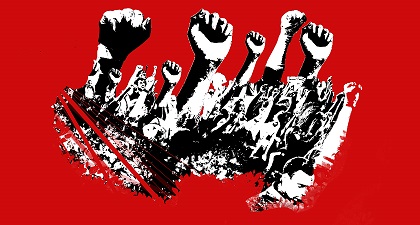
Activists who are carrying forward the democratic struggle of the Iranian people for peace, human rights and social progress need our urgent solidarity, says JAMSHID AHMADI
Amid the ongoing outrage being perpetrated against the Palestinian people right before the very eyes of the world, which quite rightfully dominates headlines internationally, the theocratic dictatorship in Iran continues to lurch headlong from one major crisis into another. Its governing doctrine of ‘Political Islam’ has utterly bankrupted and failed Iran and its people and continues to do so. The recent presidential ‘elections’ charade underlines the reality that the current political and socioeconomic model is completely unreformable.
Over 40 years on from the Islamists’ hijacking and defeat of the Popular 1979 Revolution, which ousted the Shah’s monarchical dictatorship, the theocratic regime now presides over a situation of ruin for most ordinary Iranians.
Following the regime’s brutal restructuring of Iran’s national economy in the early 1990s, which saw the application of neoliberal shock ‘therapy’ in line with IMF and World Bank prescriptions millions of Iranians were forced into acute and ever worsening levels of impoverishment with all the social problems this entails. These sweeping restructures essentially set in place the US dollar-affixed decline of the country’s economy, rendering it dangerously exposed to manipulation from Washington.
Today, only members of the regime’s senior officialdom and a parasitic bureaucratic and mercantile bourgeoise, two mutually dependent strata, stand to benefit from the current state of affairs. Eye-watering levels of corruption persist, while the economy continues in freefall and a crippling financial sanctions regime imposed from abroad serves only to exacerbate the suffering of the population at large.
The presidential ‘elections’ on 28 June were designed to boost the regime and galvanise its support base, following the mysterious death of the criminal and hugely unpopular incumbent Ebrahim Raisi (a name synonymous with the notorious massacre of political prisoners in summer 1988) in a helicopter crash. However, the exercise badly backfired when record numbers of people abstained from the vote. For the first time, fewer than 40% of those eligible to vote did so. And in Tehran, the capital city, it was less than 25%. This meant the vote, already portending a major crisis of legitimacy for the regime, went to a second-round run-off.
The hitherto little-known Masoud Pezeshkian, who ran on a supposedly ‘reformist’ ticket, won the election with the vote of 27% of those eligible to do so. He has openly declared he has no plans for material change of any kind in Iran. Moreover, upon his inauguration, he stated that he ‘owed’ his victory to Ali Khamenei, the regime’s so-called ‘Supreme Religious Leader’, for his endorsement and support before going on to acknowledge him as the final arbiter of all matters of government.
The reverberations from the ‘Woman, Life, Freedom’ uprising movement continue to be keenly felt throughout Iranian society. In many districts of most major cities in Iran, the draconian dress code, including the mandatory hijab, is openly flouted.
Workers across several sectors courageously continue to demand their rights to form actual trade unions and participate in union activity. Currently, 25,000 contract workers in the oil, gas, and petrochemicals sector are on strike for higher pay, a more humane work pattern, and wholesale improvements in their working conditions. Since early August, nurses have also been on strike demanding fair pay and conditions as well as job security.
Meanwhile, on the foreign policy front, the regime continues with its dangerous brand of adventurism and brinksmanship at the expense of the security and stability of the Iranian people, all while secretly pursuing some form of rapprochement with the US. Regardless of its outward posturing and bellicose rhetoric, the regime is clearly at pains to avoid a direct conflict with Israel and, by extension, the West. This despite numerous provocations by Israel, including assassinations and strikes on Iran’s sovereign territory. However, this highly volatile mix of crises, contradictions, and provocations could quite easily escalate into an all-out war across the Middle East, in turn potentially triggering a Third World War scenario.
The vast majority of Iranian people not only despise the policies of the regime but actively resist its oppression. Despite Iran having the highest number of state executions per population in the world year on year, according to the United Nations’ statistics, its brave daughters and sons, women, workers, youth, and students continue to seek their inalienable civil, democratic, trade union, and national rights and freedoms.
The ruling dictatorship, now one of the world’s longest, is in perpetual fear of the growing opposition to its oppressive misrule. Away from the limelight, courageous and steadfast activists risk everything to carry forward the democratic struggle of the Iranian people for peace, human rights, and social progress. And the need for principled solidarity with the Iranian people, amid the menace of another devastating war in the Middle East, has never been greater.
* This article was published on today’s Morning Star on 10 September 2024
Jamshid Ahmadi is assistant general secretary of the Committee for Defence of the Iranian People’s Rights (Codir), Unison member and a current member of the People’s Press Printing Society management committee.












 Posted in
Posted in 











